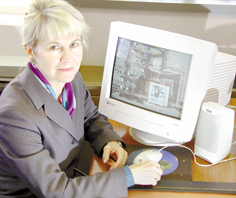|

TECHNOCATION - High-Tech women on the future of female entrepreneurship
July 11, 2001
By ELLEN WIGGINS,
Special to The Daily Record

As both a female professional and an advisor to incubator and start-up technology companies for many years, I am accustomed to skepticism. I am often subjected to two stereotypes as soon as I walk through the door for a business meeting. I have to simultaneously fight the idea that women aren't the business equals (or betters) of men while dispelling the notion that high-tech, startup companies are dubious investments.

Although things have progressed quite a bit from a few generations ago, women still make less money than men for the same work. Now that the technology economy has come crashing back to reality, startup companies face an even tougher time seeking venture capital.
When Baltimore recently hosted the Mid-Atlantic Venture Association's annual meeting, I began to wonder whether woman-owned startups face a double challenge when seeking venture capital. I decided to get some perspective on this from two area women who know quite a bit about where gender, technology and entrepreneurship meet — Debra Diamond and Joan Korenman.
Diamond has more than 25 years of professional investment experience, having been a Vice President at T. Rowe Price Associates and later, the President of the T. Rowe Price New Frontier Fund. Since 1994, she has run her own advisory firm to development stage companies, Debra Diamond & Associates. Diamond also serves on the Investment Committee for the Washington-based Women's Growth Capital Fund (www.womensgrowthcapital.com).
Korenman is director of the Center for Women and Information Technology and a professor of English and Women's Studies here at UMBC. In 1999, she and the center were recognized by ABC News.com's Wired Women column, which called CWIT's Web site (www.umbc.edu/cwit) “the best resource on women and technology on the Web.” San Francisco Women on the Web also recently named Korenman one of the Top 25 Women on the Web.
Q: Describe some obstacles or stereotypes that female tech entrepreneurs face in the business world.
DD: “Probably the single greatest obstacle is the lack of an informal network similar to the ones that many men have established through school or club ties. Many men have developed relationships with friends and acquaintances who have become successful, have capital and connections and now want to invest in, mentor or become involved in new businesses.
“Women do not have access, in many cases, to these same types of informal relationships. Business is still a man's world and much of it revolves around relationships. Men often possess the money and connections that allow them to grease the skids, which is so important, especially when a new business is getting off the ground.”
JK: “I think there are different types of obstacles. First is the difficulty in attracting venture capital. Fairly recent figures indicate that only 6 percent of all VC investments go to women-owned businesses.
“Some steps are being taken to rectify this situation. The National Women's Business Council has started an organization, Springboard Enterprises, to help women entrepreneurs get better access to venture capital. Still, this remains a serious obstacle.
“Second, female entrepreneurs also face prejudice based on the stereotype that women are not as competent as men in information technology. People who hold such beliefs may be unwilling to deal with women IT entrepreneurs or take their ideas seriously.
“Finally, there is an expectation in some IT circles that people should be willing to work around the clock to get the job done. Increasing numbers of men, too, find this notion unappealing, but it impacts especially hard on women, who more often have to try to balance family responsibilities with work.
“A recent report described women as “the canary in the coal mine,” warning that an unbalanced, 24/7 work life is destructive for both men and women and for their organizations.”
Q: What's your take on the future of women in the world of high tech businesses? Are you optimistic or pessimistic? Why?
DD: “The world for women in business will improve. Women are getting a seat at the table as the nature of doing business and the makeup of the world is changing. It will take time though, because changing human behavior always takes time. It is also a numbers game and the sheer number of women is increasing.
“Women are leaving the corporate world from high level positions, with skills and accomplishments under their belts that allow them to start up businesses that would not have been possible or existed 10 years ago.
“In addition, the new generation of kids coming up are much more accepting of women in the work force, women in management, etc., as they have been watching their moms go to work and take that for granted.”
JK: “I'm optimistic. IT is increasingly vital to our lives. The demand for people with technical interests and skills is strong and likely to grow even stronger. The nation--indeed, the world--cannot afford to overlook half the population when trying to meet IT workforce demands. The demand is simply too intense.
“Another good sign is that women in high tech businesses report that they encounter more prejudice and resistance from older men than from younger ones. If we're beginning to see more acceptance of women in IT on the part of younger men, that bodes well for the future.
“As more women enter high tech businesses, those businesses are likely to change to accommodate women's needs. This is even more likely because, though the pressure may come most from women, many of the changes will benefit men and women alike. We should soon see more emphasis on creating balance between work and family, a shift from rewarding willingness to stay all night to fix a problem to rewarding more careful planning to prevent the problem in the first place.”
Q: Do you think that women owned tech firms can have certain advantages over their traditional competitors? Does the “uphill battle” make women stronger?
DD: “Yes, women possess some advantages. They are often consensus builders and team players.
“These skills may be more important for later stage companies where a management team is in place rather than a startup or early stage company.
“Women also tend to approach things in what I call the ‘girl way' which is to analyze, gather information, be systematic, etc., rather than make decisions on the fly, which is sometimes how entrepreneurs and early stage companies operate.
“Men tend to make decisions on the golf course, in the locker room or because a guy is a ‘good guy' rather than through any systematic process. I don't believe that an individual's response to the ‘uphill battle' of building a company is gender based. In the long run, good judgment, luck, perseverance, passion, drive and energy win out and these characteristics are not gender based.”
JK: “Though I'm reluctant to make generalizations about women or women-owned businesses, many people believe that women tend to excel in cooperating and communicating, two qualities that IT businesses (indeed, all businesses) need.
“As for the second part of your question, sometimes an uphill battle creates strength, but sometimes it crushes or warps people.”
I hoped you enjoyed these words of wisdom from Joan Korenman and Debra Diamond as much as I did. If you have thoughts on women and high-tech business, please share them with us at technocation@umbc.edu.
|